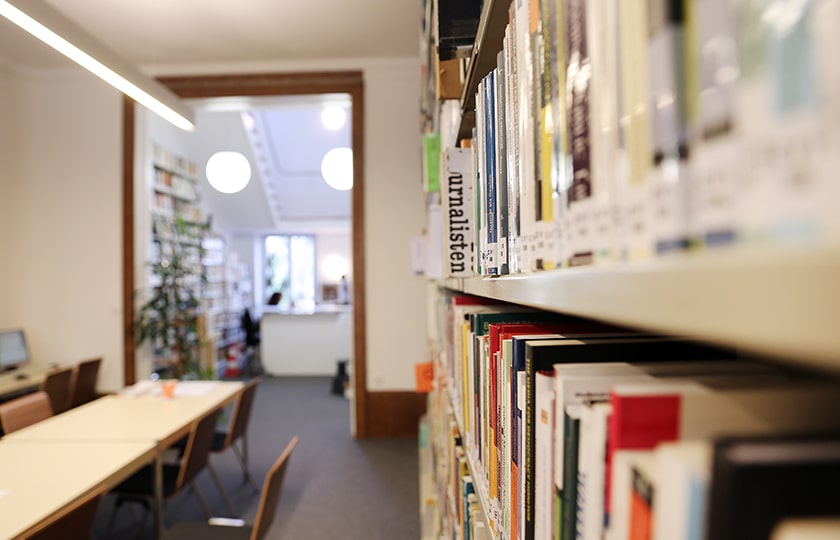The transfer of our research results and the exchange with politics, business, civil society groups and the general public are of great importance to us.
Knowledge Transfer, Advice and Services
We understand knowledge transfer as an exchange process between science and social actors.
In addition to the scientific community and representatives from politics and business, our target groups include ministries and supervisory authorities, self-regulatory bodies, especially journalists, but also, for example, parents and teachers in the context of media education issues and other civil society organizations such as the German Civil Service Association or the Children’s Health Foundation.
In addition to the website, which documents all relevant activities and publications, our social media offerings on LinkedIn and Threads, the BredowCast, the Media Research Blog and numerous events for different target groups, at which the research results are presented and discussed, serve to communicate our research findings.
We make it our task to check the practical relevance of the results obtained in the projects and to actively communicate the results to the target group. In the case of larger projects, the Institute often publishes the results not only in a report and in articles for the scientific community, but also in summaries that can be understood by laypeople.
Long-Term Areas of Expertise Enable Knowledge Transfer and Consulting
By their very design, many of the Institute’s projects involve transfer and exchange to varying degrees. This applies above all to those projects that are developed in the Institute’s areas of expertise within Research Program 3 “Knowledge for the Media Society”. These four areas of expertise are “Growing Up in Digital Media Environments”, “Public Service and Public Value”, “Health Communication” and “Media History”.
Expertise on Current Media Policy Issues and Problems
The Institute’s expertise is in demand from media policy and practice; here the Institute helps to deal with current issues, for example at hearings and with statements and expert opinions.
Projects and events are also developed in cooperation with non-academic institutions. This makes the results relevant to practice and at the same time enables the Institute to better fulfill its claim of conducting problem-oriented research. Examples of this are the media symposia held regularly with the Media Authority Hamburg/Schleswig-Holstein and the Hamburg Chamber of Commerce, the topics of which are developed jointly by the organizers and which are always attended by over 200 interested people.
Service for the Scientific Community: Journal “Medien & Kommunikationswissenschaft”
The academic journal “Medien & Kommunikationswissenschaft” (M&K, Media & Communication Science) has been published by the Institute since 1953 (until the end of 1999 under the name “Rundfunk und Fernsehen“) and has been published quarterly by Nomos-Verlag, Baden-Baden, in open access since 2021.
Editorial supervision is carried out by the editorial staff of the HBI; the Institute does not receive any subsidies for this.
The journal follows the double blind peer review standard. Since 2008, M&K has been one of the three journals whose subscription is included in the membership fee of the German Association for Journalism and Communication Studies.
Press Inquiries: Employees in the Media
The Institute’s press office answers inquiries from journalists and puts them in touch with contacts inside and outside the Institute. This often involves a professional assessment of current media developments in interviews for television, radio, online or in the press, but frequently also background discussions with editorial offices, news agencies and associations.
The employees are also available to answer questions about literature, factual information and as consultants and advisors on research issues. This type of “informal” service is often used by the reference groups and is also used intensively by journalists.
BredowCast / Blog / social media
In the BredowCast, an audio podcast that appears monthly, Johanna Sebauer provides insights into the research topics at the institute and the everyday life of the researchers in conversation with changing guests.
The institute is also active on the social media platforms LinkedIn (@Leibniz-Institut für Medienforschung | Hans-Bredow-Institut) and Threads (@bredowinstitut).
In the Media Research Blog, the Institute’s researchers blog on topics from communication studies and media law.
Library
The Institute’s library – one of the most important specialist libraries for media/media research in northern Germany – has over 32,500 volumes in its collection. This book collection is supplemented by an extensive journal section containing both German-language and foreign specialist journals as well as press and information services on the aforementioned research areas. A much-used rarity is the program magazine Hör zu, which is archived from issue 1/1946 onwards.
The library is accessible to everyone, but registration is required.
As the library catalog is available online, searches can also be carried out from outside Hamburg at any time.
Photo by Priscilla Du Preez on Unsplash




